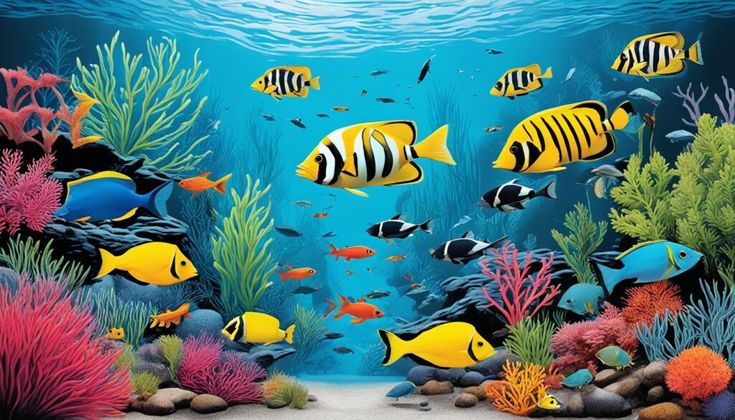Notable Marine Species
- Parrotfish (Scarus spp.): Parrotfish are found in coral reefs and play an essential role in maintaining reef health. Their feeding habits help control algae growth, which can otherwise overpower coral reefs. Parrotfish are also economically valuable as both food and in the aquarium trade.
- Lionfish (Pterois volitans): An invasive species in the Indian Ocean, lionfish are known for their venomous spines and striking appearance. Though they pose a threat to native fish populations, understanding their role in African marine environments is essential for managing ecosystems.
- African Pompano (Trachinotus africanus): This species is particularly abundant off the western coast of Africa and is important in both artisanal and commercial fishing industries. Its striking appearance and fast swimming abilities make it a favorite among both local fishermen and tourists.
Marine Ecosystem Roles
Marine scaled fish are often integral to the health of coral reefs and seagrass beds.
Their grazing behavior helps maintain these ecosystems by preventing the overgrowth of algae.
Moreover, their life cycles support a variety of marine animals, from predators to scavengers, creating a balanced ecosystem that benefits other species.
4. Ecological Importance of Scaled Fish
The ecological roles of African scaled fish cannot be overstated. In both freshwater and marine environments, these fish help maintain the health of their habitats through their feeding, breeding, and migration behaviors.
Nutrient Cycling and Water Quality
Scaled fish species, particularly those in freshwater environments, are vital in cycling nutrients through ecosystems. They feed on organic matter such as plant material, insects, and algae, breaking it down into forms that can be utilized by other organisms. This activity helps to prevent the buildup of excess nutrients in the water, promoting clean and healthy aquatic habitats.
Supporting Biodiversity
Many species of African fish provide a crucial food source for larger predators, including birds, reptiles, and mammals.
The presence of healthy fish populations helps maintain the food webs that sustain these other species, ensuring biodiversity across Africa’s ecosystems.
5. Cultural and Economic Significance
Beyond their ecological importance, African scaled fish have deep cultural and economic significance. Many communities depend on these fish for sustenance, and they are often an essential part of local economies through fishing and aquaculture.
Cultural Importance
In several African cultures, fish hold symbolic importance, often representing fertility, prosperity, or spiritual strength. Festivals, rituals, and stories surrounding fish are common in various regions, demonstrating the deep connection between these species and the people who rely on them.
Economic Role
Fish are a key protein source for millions of people across Africa, especially in rural areas. In many countries, local fisheries are central to food security and poverty alleviation. Scaled fish species, such as tilapia and catfish, are essential to both small-scale subsistence fishing and large-scale commercial fisheries.
6. Conservation Challenges
The conservation of African scaled fish faces numerous challenges, many of which are related to human activities. Overfishing, habitat destruction, and climate change are just a few of the threats that have put these species at risk.
Overfishing
Overfishing is a major issue for many African fish species. As demand for fish grows, many populations are being exploited faster than they can replenish. This can lead to a decline in fish numbers and negatively impact the ecosystems that depend on them.
Habitat Loss
The destruction of aquatic habitats, such as river systems, wetlands, and coral reefs, poses a significant threat to many species. Pollution, damming, and urbanization are common causes of habitat degradation, which makes it harder for fish to thrive and reproduce.
Climate Change
Changes in water temperature, precipitation patterns, and sea levels due to climate change are affecting the habitats of African scaled fish. Warmer waters may force species to migrate to cooler areas, disrupting their traditional ranges and potentially leading to population declines.
7. Current Conservation Efforts
Various conservation initiatives are underway to protect African scaled fish and their habitats. These efforts focus on sustainable fishing practices, habitat restoration, and climate adaptation strategies.
Sustainable Fishing Practices
Governments and organizations are promoting sustainable fishing practices to prevent overfishing and ensure that fish populations remain healthy. This includes implementing fishing quotas, seasonal closures, and promoting aquaculture as a more sustainable alternative.
Habitat Restoration Projects
Conservationists are working to restore vital habitats for scaled fish species. Projects include replanting mangroves, protecting riverbanks, and restoring coral reefs to provide safe environments for fish to live and breed.
8. Case Studies
The Nile Tilapia Conservation Project
In Lake Victoria, the Nile tilapia has been the focus of various conservation efforts. These include breeding programs to restock fish populations and efforts to combat pollution and invasive species that threaten the fish’s habitat.
Coral Reef Protection in South Africa
In South Africa, organizations are working to protect and restore coral reefs, which are vital for marine scaled fish species like the African pompano. This includes the establishment of marine protected areas and initiatives to reduce fishing pressure.
9. Conclusion
The African continent is home to a remarkable diversity of scaled fish species, each playing crucial roles in the health of freshwater and marine ecosystems.
These fish are not only vital to biodiversity but also to the cultural and economic wellbeing of countless African communities.
However, these species face numerous challenges, from overfishing to climate change, which threaten their survival.
Protecting these fish requires a concerted effort from governments, conservationists, and local communities.
By promoting sustainable fishing practices, restoring habitats, and addressing the impacts of climate change, we can ensure that Africa’s scaled fish continue to thrive for generations to come.

Veronezi Santos — Between Rivers, Oceans, and Words
Veronezi Santos is a writer and professional fisherman, guided by a passion for nature.He has studied rivers and lakes across the Americas, Europe, and Africa, always in search of underwater life.
He specializes in freshwater marine fauna, with a focus on the fish of South Africa.He transforms scientific observations into engaging and accessible texts.His writing combines knowledge, field experience, and a deep love for biodiversity.
